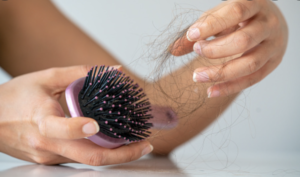Three COVID-Related Hormonal Problems
A pattern of hormonal problems started to emerge with my clients who have either contracted and recovered from COVID, or who have gotten the vaccine. At first, I didn’t see it. But after over a handful of clients began complaining about the same issues, I realized that indeed, the virus has an impact on the endocrine system.
Before we dive in, there are a few things I want to say-
- I am not a doctor or medical professional, just a teacher and an observer.
- I am not advising on medical matters, just sharing my clients’ anonymous experiences.
Ok, now that we have that out of the way, let’s talk hormone problems after COVID exposure.
1. Hair Loss
This one is the biggest problem for women. Night sweats? I can deal. But prolonged and intense hair loss? Oh hell no! My girls are insistent on reversing this problem.
A few months ago, one of my clients (T) who has been super compliant on her program started complaining of hair loss. As an FDN-P, I’m trained to know that the body cannot and will not divert energy and resources to unnecessary areas when stressed. In my line of work, hair loss tends to be a side effect of malnutrition, overexercise, calorie restriction, insufficient sleep, and stress. I’ve observed meaningful hair loss in women who come from a background of undernourishment. Hair loss also tends to happen after having a baby as estrogen levels fall off dramatically.
But T was eating plenty of good quality protein, getting enough sleep, reducing unnecessary stress, and was years removed from her last pregnancy.
We added biotin, collagen, B vitamins, red meat, and less exercise to her regimen. Yet the hair loss continued.
“I’m showing my husband the clumps of hair that are falling out in the shower every day and it’s starting to freak us both out,” she told me a few weeks ago.
She reminded me that she had COVID earlier this year and asked if the virus could be the reason her hair was falling out. I wasn’t sure at the time, but I’m sure now.
It’s hard to start and finish a complete experimental study in less than a year, so the published research is few and far between. However, this scientific article from the International Journal of Dermatology reports the following:
“Herein, we present 10 patients with concerns of increased hair loss following SARS‐CoV‐2 infection (Table 1). The patients are all female, with no history of hair loss, diverse ethnic backgrounds, and a median age of 55. All patients had laboratory confirmed COVID‐19, six reported mild symptoms, and four presented with severe disease requiring hospitalization. They all experienced excessive hair loss within weeks to months after infection, which included hair coming out in large clumps and thinning along the frontal hairline. While limited physical exam was available for the patients seen by telemedicine, overall exams revealed noncicatricial loss of hair volume, pronounced thinning, and positive hair‐pull test (Table 2). Besides COVID‐19, the patients did not report any new medical conditions, medications, or lifestyle modifications.”
While the sample size was small, the results were conclusive: COVID can lead to excessive hair loss, especially in females. In bleak final statement, the article ends:
“With increasing numbers of recovering patients, the risk of developing this physically and emotionally distressing dermatologic manifestation will likely continue.”
That said, there are ways to help prevent hair loss due to COVID.
Hair Loss Prevention Strategies
- Eat Meat
- Take Biotin
- Take Collagen
Eating plenty of good quality protein is the best first step. Your hair is soft tissue that is made from keratin and amino acids and plenty of animal protein is necessary to build strong and healthy hair in the first place. Aim to get 16 oz of good, high-quality meat a day. That is not a typo. Meat on meat on meat, as long as you are digesting it well. Get your meat from a local quality butcher or grab it online. You can invest in quality food now or hospital bills later. If you’re unable to digest that much meat, we have a different problem:
You can also start supplementing B vitamins emphasizing biotin and also collagen- grab my favorites here. Directions for use are in the protocol link above.
2. Heavier Periods
I wasn’t sure if this symptom was COVID related at first, either. Over the past few months, multiple women have reached out to ask me if their increased blood flow and bigger clots and more painful cramps could be due to the virus or the vaccine. After hearing this story week after week, I became convinced that the virus at least played a role in the hormonal problems women were experiencing.
The research actually suggests that estrogen plays a protective role in COVID– could this be one of the reasons our men are falling victim to extreme viral-related illness while women tend to sail on through their infections?
“Women tend to have a more responsive immune system compared to men so that the outcome and survival rates from infections or sepsis are often better in females than in males [26].”
and
“Numerous additional studies, beyond the scope of this article, have confirmed male-female differences in the immune response, that generally the female immune response is superior, and estrogen driven, but also that this superior response could explain the higher prevalence of auto-immune disease in women when the immune system behaves in an aberrant fashion”.
Translation: our hyper-immune systems might protect is better from acute viruses, but they also set the stage for autoimmune issues- autoimmune problems are found far less frequently in men.
But that does not explain why women’s periods are so….off after an infection or a vaccine.
Here’s my theory:
COVID steals women’s progesterone. I can back that up. Check out this obscure study showing a small sample size of men being treated with progesterone as a COVID therapy. The conclusion?
“Patients treated with progesterone required three fewer days of supplemental oxygen (median, 4.5 vs 7.5 days) and were hospitalized for 2.5 fewer days (median, 7.0 vs 9.5 days) as compared with control subjects.”
We can draw the reasonable conclusion that progesterone is immunomodulatory against COVID. An infection or the vaccine may mean that women’s progesterone is being diverted for cortisol use, or that the raw materials to create progesterone aren’t available in enough quantity for progesterone creation.
When progesterone levels decrease, the effects of estrogen are amplified. As most women suffer from estrogen dominance, this may exacerbate an already-present problem.
When progesterone drops and estrogen increases, period problems show up as heavy bleeding, large blood clots, increased PMS, stronger cramps, and premenstrual headaches.
Solution? Get your hormone levels checked ASAP. We can run a DUTCH test, or you can ask your provider for a blood panel and look at progesterone levels around day 19 of your cycle. If they are low, you can work with your provider to use bioidentical progesterone for a period of time.
3. Night Sweats
Again, the research is scant, but God bless the scientists who take the time to document abnormal symptoms they notice from the general population.
In an article from the journal Microbial Pathogenesis published in December 2020, previous research found that about 50% of those suffering from COVID also experienced sticky nights:
“In a study of 212 people infected with SARS-CoV-2, 114 reported “profuse sweating” and 102 of them reported “night sweats”.”
The purpose of this particular published study was to see whether COVID was excreted and contractable through sweat (spoiler- it is!). However, the introduction section does show that night sweats are a fairly common issues with COVID.
I’ve seen this in my own practice as women report awful night sweats after both the virus and the vaccine.
Night sweats are usually hormonal. Men don’t tend to get them, but in menopause, women from every culture suffer from the not-fun kind of hot night.
We know that for women, night sweats are associated with a hormonal imbalance- in this case, low estrogen. So if a woman is close to menopause and gets COVID, the risk of both estrogen-deficient and COVID-prevalent night sweats increases.
If that’s the case, you can try some black cohosh, one of my favorite herbs for decreasing night sweats. Take as directed on the bottle.
Of course, it’s entirely possible that the night sweats are simply a byproduct of a fever. A hot body needs to cool down, and sweating is the best way to do so. It’s just super annoying to soak your sheets and your pajamas night after night.
You can also take hot epsom salt baths to preempt that night sweat and to facilitate healing.

photo via unsplash by Jared Rice
Most of what I am presenting today is theoretical as there is no consensus from the experts on why COVID increases endocrine confusion in women.
As concerns rise over the vaccine decreasing fertility in both women and men, it’s wise to think about the long-term implications on ourselves and our children. I am not advocating one way or the other, just trying to provide information and a conversation.
The best offense is a good defense, so I’ve created a mini-course on vitamins, minerals, and the steps you can take to keep your family healthy. You can find that here. Let me know if you have any questions, and here’s to your continued hormone health.
Love,
Jennifer







